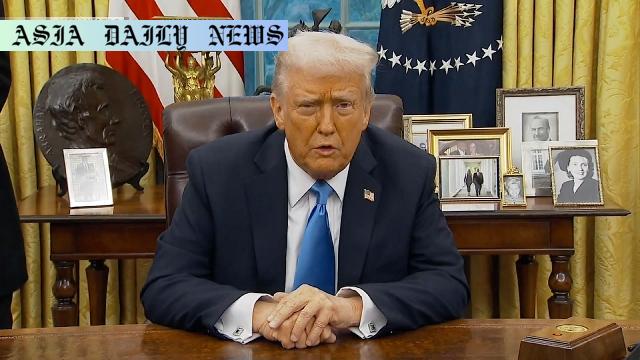Tax Cuts: US President Donald Trump signs a historic domestic policy bill including tax breaks, spending cuts, and border security funding.
- Tax Cuts: Trump signs historic domestic policy bill into law.
- Bill includes massive tax cuts, spending reductions, and border security funding.
- Legislation faces criticism for adding $3.4 trillion to US debt.
- Concerns over funding cuts to climate initiatives and healthcare arise.
- Trump considers the largest tax reform as a boost for economic growth.

Introduction to the Sweeping Policy
US President Donald Trump recently signed a groundbreaking domestic policy bill into law at the White House, which includes significant tax cuts, spending reductions, and increased border security funding. The bill has sparked nationwide debate over its implications for both the economy and various public sectors. Despite opposition, Trump’s administration views this initiative as a stepping stone toward unprecedented economic growth, aiming to stimulate prosperity “like a rocket ship.”
Key Provisions of the Bill
Among its key features, the bill extends personal tax cuts introduced during Trump’s first term and exempts restaurant workers from taxes on tips and overtime pay for a certain period. Although hailed by the President as the largest tax cut in US history, these measures will come at a cost, as projected by the Congressional Budget Office (CBO). The CBO estimates that the legislation will increase the national debt by approximately $3.4 trillion over the next decade.
Furthermore, the policy prioritizes border security through additional funding, while reducing expenditure on climate initiatives and tightening healthcare systems for low-income citizens. Critics argue that this abrupt scaling back contradicts long-term environmental and social objectives, potentially exacerbating challenges in addressing climate change and ensuring accessible healthcare.
Economic Benefits vs. Financial Concerns
The bill’s emphasis on promoting economic growth resonates strongly with Trump’s pro-business rhetoric. Cutting taxes for individuals and businesses is expected to boost consumer expenditure, corporate investments, and overall economic activity. Yet, concerns over financial sustainability loom large. Critics worry that the growing national debt could lead to future fiscal difficulties, undermining the very economic growth the legislation intends to achieve.
Voices of Opposition
Even within Trump’s Republican party, the bill faced significant resistance. Several lawmakers expressed concerns regarding its broader implications, emphasizing the disproportionate effects on vulnerable communities. Funding cuts to critical programs such as healthcare and climate change initiatives have drawn sharp criticism, highlighting the potential for increased inequality and environmental neglect.
Long-Term Implications
While the immediate political victory for the Trump administration is evident, analysts remain divided on the long-term consequences of the policy. Will the short-term benefits of tax cuts translate into sustained growth, or will the mounting national debt offset these gains? The answers to these questions will significantly shape the US economy and society in the coming years.
Conclusion
President Trump’s decision to enact the sweeping domestic policy reform signifies a bold move, reflecting his administration’s determination to prioritize economic growth over potential fiscal and social concerns. While the legislation undoubtedly carries significant risks, its success or failure will ultimately determine how history judges its impact on America’s future.



Commentary
An Insightful Look Into Trump’s Tax Policy Impact
The recently signed tax reform bill by President Donald Trump is both groundbreaking and contentious. It signifies a drastic rethinking of America’s fiscal priorities, aiming to redefine the nation’s path toward economic growth. While ambitious, the sweeping nature of this policy raises concerns about its sustainability and broader implications.
The Economic Potential
On one hand, the tax cuts and business-friendly reforms align with Trump’s goal of positioning America as a leading global economic powerhouse. Historical data suggests that reducing tax burdens often spurs investments and jobs, especially in key sectors. The vision of rocket-fueled growth invokes optimism, offering promises of prosperity and enhanced competitiveness on the global stage. For countless individuals and small businesses, the immediate relief provided by lower taxes represents a tangible economic boon.
The Societal and Fiscal Dilemma
However, the policy’s critics warn that optimism cannot overshadow stark realities. Adding $3.4 trillion to the national debt over the upcoming decade raises legitimate fiscal concerns. Balancing economic expansion with responsible financial stewardship is critical, but this legislation appears to embrace growth at the potential cost of long-term stability. Moreover, reductions in climate change funds and tightening healthcare access will disproportionately affect low-income citizens who rely on these programs for security and well-being.
Final Reflection
This bill encapsulates a complicated tension between short-term economic gains and long-term societal impact. As lawmakers and analysts dissect its ramifications, one thing is clear: this policy represents a pivotal moment in American governance. Its future efficacy will likely determine not only Trump’s legacy but also the trajectory of the US economy for generations to come.